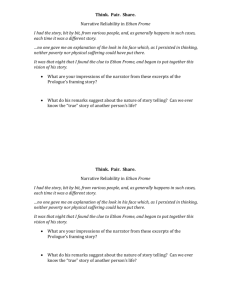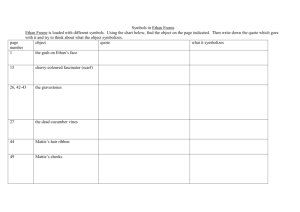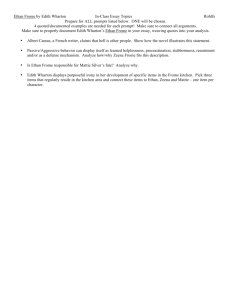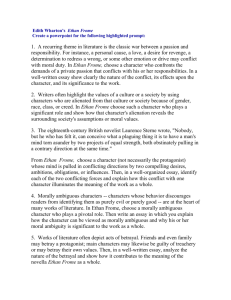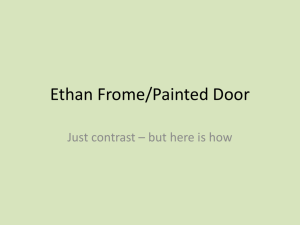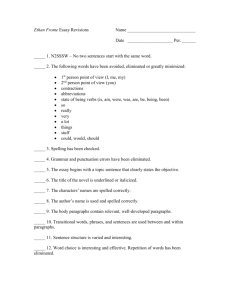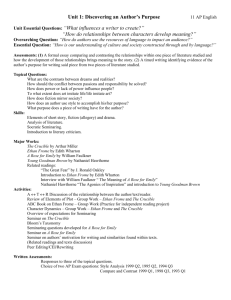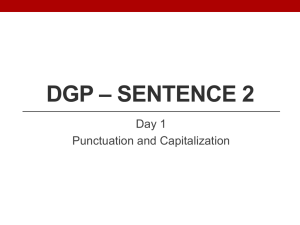Senior Summer Assignment-2015
advertisement
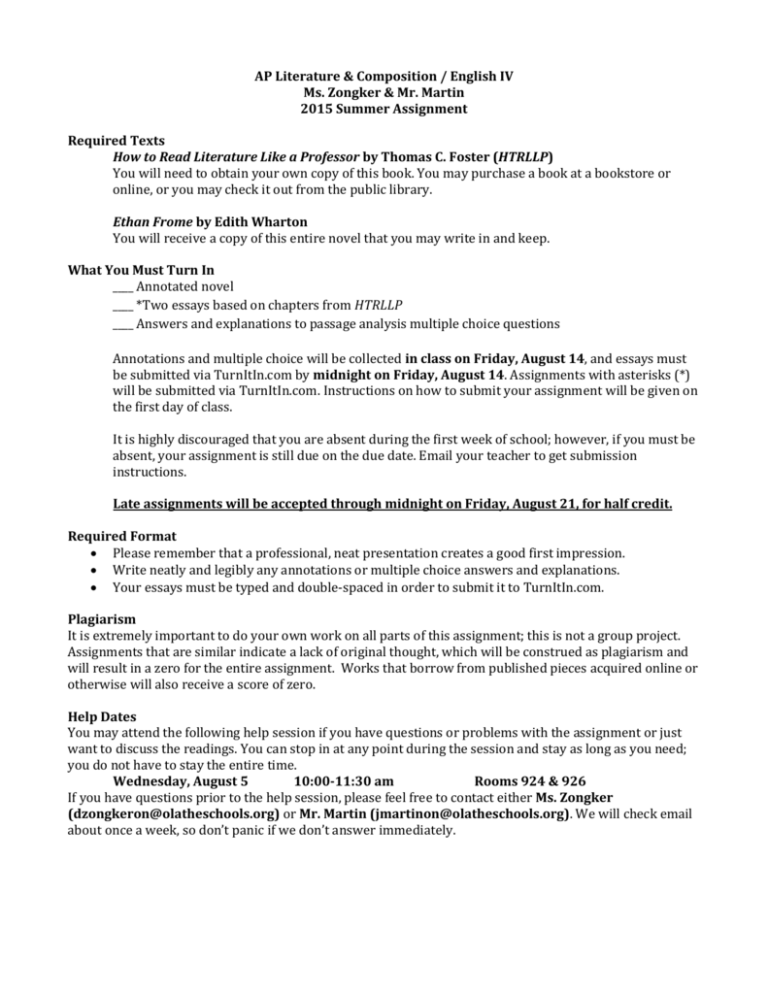
AP Literature & Composition / English IV Ms. Zongker & Mr. Martin 2015 Summer Assignment Required Texts How to Read Literature Like a Professor by Thomas C. Foster (HTRLLP) You will need to obtain your own copy of this book. You may purchase a book at a bookstore or online, or you may check it out from the public library. Ethan Frome by Edith Wharton You will receive a copy of this entire novel that you may write in and keep. What You Must Turn In ____ Annotated novel ____ *Two essays based on chapters from HTRLLP ____ Answers and explanations to passage analysis multiple choice questions Annotations and multiple choice will be collected in class on Friday, August 14, and essays must be submitted via TurnItIn.com by midnight on Friday, August 14. Assignments with asterisks (*) will be submitted via TurnItIn.com. Instructions on how to submit your assignment will be given on the first day of class. It is highly discouraged that you are absent during the first week of school; however, if you must be absent, your assignment is still due on the due date. Email your teacher to get submission instructions. Late assignments will be accepted through midnight on Friday, August 21, for half credit. Required Format Please remember that a professional, neat presentation creates a good first impression. Write neatly and legibly any annotations or multiple choice answers and explanations. Your essays must be typed and double-spaced in order to submit it to TurnItIn.com. Plagiarism It is extremely important to do your own work on all parts of this assignment; this is not a group project. Assignments that are similar indicate a lack of original thought, which will be construed as plagiarism and will result in a zero for the entire assignment. Works that borrow from published pieces acquired online or otherwise will also receive a score of zero. Help Dates You may attend the following help session if you have questions or problems with the assignment or just want to discuss the readings. You can stop in at any point during the session and stay as long as you need; you do not have to stay the entire time. Wednesday, August 5 10:00-11:30 am Rooms 924 & 926 If you have questions prior to the help session, please feel free to contact either Ms. Zongker (dzongkeron@olatheschools.org) or Mr. Martin (jmartinon@olatheschools.org). We will check email about once a week, so don’t panic if we don’t answer immediately. THE ASSIGNMENT Reading and annotating HTRLLP and Ethan Frome 1. Read the attached information on annotation. Keep this information in mind while reading Ethan Frome. 2. Read and annotate How to Read Literature Like a Professor. Although we will not check or grade these annotations, we will use this text all year and annotating it will help you all year. 3. Read and annotate Ethan Frome. You may write in your copy. You should keep the essay topics that follow in mind as you read and annotate, as well as the annotation suggestions from the handout (see #1 above). 4. You will turn in your copy of the novel, and one chapter of your annotations will be graded. The graded chapter will be chosen at random. Essays Choose two of the three prompts below. For each, write a well-developed, short essay over Ethan Frome discussing the quotation and issues raised in the chapter of HTRLLP. Each essay should be at least one typed, double-spaced page and should incorporate quotes from the novel with correct parenthetical citations. a. Chapter 12: “Is That a Symbol?” Foster writes that “in general a symbol can’t be reduced to standing for only one thing “ (98). Choose a symbol from Ethan Frome which “is likely not reducible to a single statement but will more probably involve a range of possible meanings and interpretations” (98). In an essay, explore the possible meanings of your chosen symbol and how these interpretations relate to the meaning of the novel as a whole. b. Chapter 20: “…So Does Season” In his discussion of seasons, Foster claims that “We read the seasons in them [books and poems] almost without being conscious of the many associations we bring to that reading” (183). In an essay, explore the associations you bring to the seasons in Ethan Frome and discuss how these associations relate to the meaning of the novel as a whole. c. Chapter 24: “…And Rarely Just Illness” Foster claims that literary diseases “should have strong symbolic or metaphorical possibilities” (217). In an essay, explore the symbolic or metaphorical possibilities behind an illness or physical disability in Ethan Frome and discuss how these possibilities relate to the meaning of the novel as a whole. Multiple Choice Complete the attached multiple choice questions over the passage from Ethan Frome. Choose the best answer for each question and, on the lines provided, write a brief explanation of why you chose your answer. AP Literature & Composition Summer Reading and Annotation “Every text is a lazy machine asking the reader to do some of its work.” – Umberto Eco Why annotate? → Annotation encourages to read actively and thoughtfully. → Annotation provides you with a useful overview to consult before discussions or writing assignments. How to annotate → Use a pen so you can make circles, brackets, and notes. Throw away the highlighter; highlighters actually distract from the business of learning and interacting with the text. → Look for and label patterns. Specifically, look for motifs, symbols, images, character behaviors or descriptions, setting, etc. → Mark passages that seem to jump out at you because they suggest an important idea or theme – or for any other reason. Passages often jump out because of an arresting figure of speech or image, intriguing sentence pattern or word choice, foreshadowing, a key moment in the plot, a bit of dialogue that reveals character, clues about the setting, etc. → Mark things that puzzle, intrigue, please, or displease you. Ask questions, make comments – talk back to the text! → At the ends of chapters or sections, write a bulleted list of key plot events. This not only forces you to think about what happened, see it as a whole, and identify patterns, but you also create a convenient record of the whole work to use as reference. → Circle words you want to learn or words that jump out at you for some reason. → Listen and pay attention to the questions in your head. As you hear yourself ask questions, write them down to address later in the text or in class discussion. “How to Mark a Book” by Mortimer J. Adler You know you have to read “between the lines” to get the most out of anything. I want to persuade you to do something equally important in the course of your reading. I want to persuade you to “write between the lines.” Unless you do, you are not likely to do the most efficient kind of reading. I contend, quite bluntly, that marking up a book is not an act of mutilation but of love. You shouldn’t mark up a book which isn’t yours. Librarians (or your friends) who lend you books expect you to keep them clean, and you should. If you decide that I am right about the usefulness of marking books, you will have to buy them. Most of the world’s great books are available today, in reprint editions, at less than a dollar. There are two ways in which one can own a book. The first is the property right you establish by paying for it, just as you pay for clothes and furniture. But this act of purchase is only the prelude to possession. Full ownership comes only when you have made it a part of yourself, and the best way to make yourself a part of it is by writing in it. An illustration may make the point clear. You buy a beefsteak and transfer it from the butcher’s icebox to your own. But you do not own the beefsteak in the most important sense until you consume it and get it into your bloodstream. I am arguing that books, too, must be absorbed in your bloodstream to do you any good. Confusion about what it means to own a book leads people to a false reverence for paper, binding, and type—a respect for the physical thing—the craft of the printer rather than the genius of the author. They forget that it is possible for a man to acquire the idea, to possess the beauty, which a great book contains, without staking his claim by pasting his bookplate inside the cover. Having a fine library doesn’t prove that its owner has a mind enriched by books; it proves nothing more than that he, his father, or his wife, was rich enough to buy them. There are three kinds of book owners. The first as all the standard sets and best-sellers—unread, untouched. (This deluded individual owns woodpulp and ink, not books.) The second has a great many books—a few of them read through, most of them dipped into, but all of them as clean and shiny as the day they were bought. (This person would probably like to make books his own, but is restrained by a false respect for their physical appearance.) The third has a few books or many— every one of them dog-eared and dilapidated, shaken and loosened by continual use, marked and scribbled in from front to back. (This man owns books.) Is it false respect, you may ask, to preserve intact and unblemished a beautifully printed book, an elegantly bound edition? Of course not. I’d no more scribbled all over a first edition of Paradise Lost than I’d give my baby a set of crayons and an original Rembrandt! I wouldn’t mark up a painting or statue. Its soul, so to speak, is inseparable from its body. And the beauty of a rare edition or of a richly manufactured volume is like that of a painting or a statue. But the soul of a book can be separated from its body. A book is more like the score of a piece of music than it is like a painting. No great musician confuses a symphony with the printed sheets of music. Arturo Toscanini reveres Brahms, but Toscanini’s score of the C-minor Symphony is so thoroughly marked up that no one but the maestro himself can read it. The reason why a great conductor makes notations on his musical scores—marks them up again and again each time he returns to study them—is the reason why you should mark your books. If your respect for magnificent binding or typography gets in the way, buy yourself a cheap edition and pay your respects to the author. Why is marking up a book indispensable to reading? First, it keeps you awake. (And I don’t mean merely conscious; I mean wide awake.) In the second place, reading, if it is active, is thinking, and thinking tends to express itself in words, spoken or written. The marked book is usually the thought-through book. Finally, writing helps you remember the thoughts you had, or the thoughts the author expressed. Let me develop these three points. If reading is to accomplish anything more than passing time, it must be active. You can’t let your eyes glide across the lines of a book and come up with an understanding of what you have read. Now an ordinary piece of light fiction, like, say, Gone with the Wind, doesn’t require the most active kind of reading. The books you read for pleasure can be read in a state of relaxation, and nothing is lost. But a great book, rich in ideas an beauty, a book that raises and tries to answer great fundamental questions, demands the most active reading of which you are capable. You don’t absorb the ideas of John Dewey the way you absorb the crooning of Mr. Vallee. You have to reach for them. That you cannot do while you’re asleep. If, when you’ve finished reading a book, the pages are filled with your notes, you know that you read actively. The most famous active reader of great books I know is President Hutchins of the University of Chicago. He also has the hardest schedule of business activities of any many I know. He invariably reads with a pencil, and sometimes, when he picks up a book and pencil in the evening, he finds himself, instead of making intelligent notes, drawing what he calls “caviar factories” on the margins. When that happens, he puts the book down. He knows he’s too tired to read, and he’s just wasting time. But, you may ask, why is writing necessary? Well, the physical act of writing, with your own hand, brings words and sentences more sharply before your mind and preserves them better in your memory. To set down your reaction to important words and sentences you have read, and the questions they have raised in your mind, is to preserve those reactions and sharpen those questions. Even if you wrote on a scratch pad, and threw the paper away when you had finished writing, your grasp of the book would be surer. But you don’t have to throw the paper away. The margins (top and bottom, as well as side), the end-papers, the very space between the lines, are all available. They aren’t sacred. And, best of all, your marks and notes become an integral part of the book and stay there forever. You can pick up the book the following week or year, and there are all your points of agreement, disagreement, doubt, and inquiry. It’s like resuming an interrupted conversation with the advantage of being able to pick up where you left off. And that is exactly what reading a book should be: a conversation between you and the author. Presumably he knows more about the subject that you do; naturally, you’ll have the proper humility as you approach him. But don’t let anybody tell you that a reader is supposed to be solely on the receiving end. Understanding is a two-way operation; learning doesn’t consist in being an empty receptacle. The learner has to question himself and question the teacher. He even has to argue with the teacher, once he understands what the teacher is saying. And marking a book is literally an expression of your differences, or agreements, of opinion with the author. There are all kinds of devices for marking a book intelligently and fruitfully. Here’s the way I do it: 1. Underlining: of major points, of important or forceful statements. 2. Vertical lines at the margin: to emphasize a statement already underlined. 3. Star, asterisk or other doo-dad at the margin: to be used sparingly, to emphasize the ten or twenty most important statements in the book. (You may want to fold the bottom corner of each page on which you use such marks. It won’t hurt the sturdy paper on which most modern books are printed, and you will be able to take the book off the shelf at any time and, by opening it at the folded-corner page, refresh your recollection of the book.) 4. Numbers in the margin: to indicate the sequence of points the author makes in developing a single argument. 5. Numbers of other pages in the margin: to indicate where else in the book the author made points relevant to the point marked; to tie up the ideas in a book, which, though they may be separated by many pages, belong together. 6. Circling of keys words or phrases. 7. Writing in the margin, or at the top or bottom of the page, for the sake of: recording questions (and perhaps answers) which a passage raised in your mind; reducing a complicated discussion to a simple statement; recording the sequence of major points right through the book. I use the end-papers at the back of the book to make a personal index of the author’s points in the order of their appearance. The front end-papers are, to me, the most important. Some people reserve them for a fancy bookplate. I reserve them for fancy thinking. After I have finished reading the book and making my personal index on the back end-papers, I turn to the front and try to outline the book, not page by page, or point by point (I’ve already done that at the back), but as an integrated structure, with a basic unity and an order of parts. This outline is, to me, the measure of my understanding of the work. If you’re a die-hard anti-book-marker, you may object that the margins, the space between the lines, and the end-papers don’t give you enough room. All right. How about using a scratch pad slightly smaller than the page size of the book—so that the edges of the sheets won’t protrude? Make your index, outlines, and even your notes on the pad, then insert these sheets permanently inside the front and back covers of the book. Or, you may say that this business of marking books is going to slow up your reading. It probably will. That’s one of the reasons for doing it. Most of us have been taken in by the notion that speed of reading is a measure of our intelligence. There is no such thing as the right speed for intelligent reading. Some things should be read quickly and effortlessly, and some should be read slowly and even laboriously. The sign of intelligence in reading is the ability to read different things differently according to their worth. In the case of good books, the point is not to see how many of them you can get through, but rather how many can get through you—how many you can make your own. A few friends are better than a thousand acquaintances. If this be your aim, as it should be, you will not be impatient if it takes more time and effort to read a great book than it does a newspaper. You may have one final objection to marking books. You can’t lend them to your friends because nobody else can read them without being distracted by your notes. Furthermore, you won’t want to lend them because a marked copy is a kind of intellectual diary, and lending it is almost like giving your mind away. If your friend wishes to read your Plutarch’s Lives, Shakespeare, or The Federalist Papers, tell him gently but firmly to buy a copy. You will lend him your car or your coat—but your books are as much a part of you as your head or your heart. AP Style Multiple Choice: Ethan Frome Please refer to the passage in the novella beginning with “Though Harmon Gough developed…” near the bottom of page four and ending with “…a man like Ethan Frome?” near the middle of page five. Circle the best answer and, on the lines provided, write a brief explanation of why you chose your answer. Your explanation may include why the other answers are wrong. 1. Given the first sentence, which statement best describes what the narrator assumes of Harmon Gow’s knowledge of Ethan Frome’s situation? I. The narrator feels Gow wants to answer his questions about Ethan, but that there are some things Gow feels are too personal about Frome to reveal to an outsider. II. The narrator feels that Gow is not knowledgeable about Frome’s past, and that he is only spreading rumors. III. The narrator feels that there is more to Frome’s story than Gow can possibly understand; otherwise, Gow would surely tell him everything. a. I only b. II only c. III only d. I and III only e. I, II, and III _________________________________________________________________________________________________________________ _________________________________________________________________________________________________________________ _________________________________________________________________________________________________________________ _________________________________________________________________________________________________________________ _________________________________________________________________________________________________________________ 2. Paragraphs 1 and 2 suggest that ___________ is an element Wharton’s syntactical style. a. the use of lengthy, loose sentence structures b. a tendency to begin sentences with coordinating conjunctions c. vivid visual and tactile imagery d. simple sentence structures, made lengthy with the addition of phrases e. the insertion of parenthetical phrases and clauses _________________________________________________________________________________________________________________ _________________________________________________________________________________________________________________ _________________________________________________________________________________________________________________ _________________________________________________________________________________________________________________ _________________________________________________________________________________________________________________ 3. In paragraph three, the narrator uses all of the following details EXCEPT ________ to define the “vitality of the climate” of Starkfield. a. “blazing blue sky” b. “torrents of light” c. “white landscape” d. “crystal clearness” e. “storms of February” _________________________________________________________________________________________________________________ _________________________________________________________________________________________________________________ _________________________________________________________________________________________________________________ _________________________________________________________________________________________________________________ _________________________________________________________________________________________________________________ 4. One might best explain the narrator’s use of the phrase “the sluggish pulse of Starkfield” as a. alliteration b. synecdoche, meant to highlight the boredom brought on by the winter. c. simile d. personification e. onomatopoeia _________________________________________________________________________________________________________________ _________________________________________________________________________________________________________________ _________________________________________________________________________________________________________________ _________________________________________________________________________________________________________________ _________________________________________________________________________________________________________________ 5. The last half of paragraph three, beginning with “when the storms of February…” might best be described as a. an analogy b. an extended metaphor c. filled with colloquialisms d. ironic e. personification _________________________________________________________________________________________________________________ _________________________________________________________________________________________________________________ _________________________________________________________________________________________________________________ _________________________________________________________________________________________________________________ _________________________________________________________________________________________________________________ 6. The word “pitched” in in the middle of paragraph three most precisely means a. erected b. thrown c. delivered d. suggested e. tuned _________________________________________________________________________________________________________________ _________________________________________________________________________________________________________________ _________________________________________________________________________________________________________________ _________________________________________________________________________________________________________________ _________________________________________________________________________________________________________________ 7. Given these three paragraphs, it is safe to describe the narrator’s attitude toward figuring out Ethan and Ethan’s situation as a. dispassionate and clinical b. brash and contemptuous c. solemn and cautious d. methodical and confused e. amused and forgiving _________________________________________________________________________________________________________________ _________________________________________________________________________________________________________________ _________________________________________________________________________________________________________________ _________________________________________________________________________________________________________________ _________________________________________________________________________________________________________________
